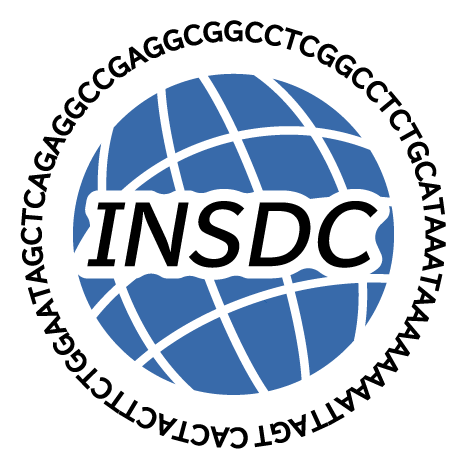- About
- Mission and Vision
- Governance
- Members
- INSDC Participating Databases
- INSDC International Stakeholders Committee
About
The International Nucleotide Sequence Database Collaboration (INSDC) is a global collaboration of independent governmental or non-profit organisations that manage nucleotide sequence databases capturing and preserving nucleotide sequence information and annotations to create a comprehensive collection that preserves the scientific record and enables broad sharing of such data. INSDC Members provide data resources that include raw sequence reads and alignments, structured metadata describing investigated samples such as taxonomic information, experimental, and project design, assembled nucleotide sequence data with functional annotation, and sequence-derived analyses. INSDC Members exchange data and make exchanged data freely accessible without restrictive licensing as part of the scientific record, including all corrections and updates.

Mission and Vision
Mission
The mission of INSDC is to support advancements in biomedical and life sciences, public health, research, innovation, discovery, education, capacity building, and bioeconomies by providing services to accept, preserve, and openly disseminate sequence data and metadata that are generated worldwide.
Vision
INSDC is the premiere open access nucleotide sequence data sharing collaboration in the world, fostering access of nucleotide sequence data from all continents and regions, and providing broad recognition to those who generate and share sequence data.
INSDC actively fulfills its mission and vision by strategically aligning its services with its core principles. This commitment is demonstrated through services including the provision of unique and persistent identifiers, use of community and INSDC defined standards for data description and sustainable management, tools and services to facilitate data use and analysis, and support for relevant community standards and best practices. Through these services, INSDC data resources become fairly and equitably available to any user.
Members commit to the following principles:
- Provision of free and unrestricted access to INSDC data resources and services to members of the public;
- Promotion of fairness and equity in access to INSDC data resources and services;
- Upholding of the quality and integrity of INSDC data resources and services through quality assurance practices; and
- Engagement with stakeholders including data depositors, data users, and journal publishers, to promote INSDC and represent its interests.
Governance
The INSDC is governed by two committees as detailed below:
Executive Committee
The Executive Committee establishes the strategic directions of INSDC, directs administrative activities such as organising meetings and overseeing the INSDC website content, resolves disputes, and sets membership expectations.
Implementation Committee
The INSDC Implementation Committee accepts INSDC-wide policies, protocols, and procedures; prepares for and responds to technology changes; approves modifications for infrastructure requirements, features, and schemas used to build INSDC-participating repositories and their services; trains, assesses, and approves new INSDC Members; and maintains website content and internal documentation.
Members
The INSDC is a collaboration between the following member organisations:
❖ The Research Organization of Information and Systems (ROIS), National Institute of Genetics (NIG)
❖ The European Molecular Biology Laboratory (EMBL), European Bioinformatics Institute (EBI)
❖ The National Library of Medicine (NLM), National Center for Biotechnology Information (NCBI) at the National Institutes of Health
Each Member:
❖ Collects nucleotide sequence data and updates data records as necessary;
❖ Provides mechanisms for submission of, and access to, data that are open to all users;
❖ Associates an INSDC accession number to submitted objects including but not limited to sequences, sample metadata, projects, that is citable in the literature and in other downstream analyses;
❖ Supports the user community through outreach and education;
❖ Builds and operates services designed for long-term sustainability;
❖ Supports INSDC-approved standardised formats for data and metadata to ensure data is interoperable and reusable;
❖ Ensures that submitted data meets minimal quality standards established by the INSDC Executive Committee;
❖ Updates data services and systems to support newly emerging sequencing platforms and data types of relevance;
❖ Exchanges data with other members at regular intervals at each site and sufficient redundancy in case of a catastrophic failure; and
❖ Follows data management conventions as established by the INSDC Executive Committee.
INSDC Participating Databases
| Data type | Research Organization of Information and Systems (ROIS), National Institute of Genetics (NIG) | European Molecular Biology Laboratory (EMBL), European Bioinformatics Institute (EBI) | National Library of Medicine (NLM), National Center for Biotechnology Information (NCBI) at the National Institutes of Health |
|---|---|---|---|
| Next Generation reads | Sequence Read Archive |
European Nucleotide Archive |
Sequence Read Archive |
| Assembled Sequences | DDBJ | GenBank | |
| Samples | BioSample | BioSample | |
| Studies | BioProject | BioProject |
INSDC International Stakeholders Committee
INSDC International Stakeholders Committee Charge
The INSDC International Stakeholders Committee (ISC) is an ad hoc group of international experts expected to promote the principles and activities of INSDC and provide input on different stakeholders’ needs, assuring that it significantly advances science in ways that are accountable to its stakeholders. Members will provide insight into the various needs of the external stakeholder community, as they relate to INSDC aims.
The ISC is expected to convene at least once a year, either in person or virtually. The INSDC will review the perspectives of the committee and consider them in light of existing legal, policy and strategic requirements of INDSC members.
Committee Roster
ISC members are appointed by INSDC Members; Associate Members appoint one individual to the ISC and Full Members appoint two individuals. ISC members serve in this role for a term of three years. A chair is chosen by ISC members.
